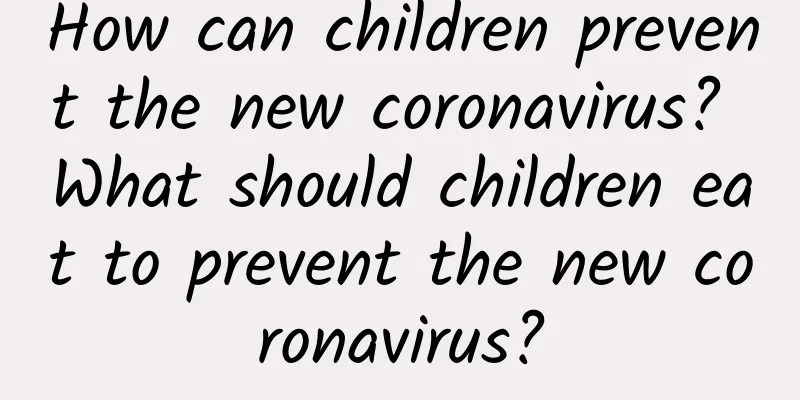How can children prevent the new coronavirus? What should children eat to prevent the new coronavirus?

|
We all know that the novel coronavirus is a relatively popular infectious disease recently. It is highly contagious and many people have been infected and sick, especially those with weaker immunity. So how can children prevent the novel coronavirus? Let's take a closer look! How can children prevent the new coronavirus?1. Timely and correct isolationParents with suspected cases in their homes who are quarantined at home, if there is no condition to separate from their children, try to ensure that the rooms are separate, and suspected parents should avoid contact with children. They need to wear appropriate masks at home (suspected parents should not wear protective masks with breathing valves at home), and children should also wear appropriate masks correctly. Epidemic supplies are in short supply. If conditions permit, children's N95 anti-bacteria masks should be selected first, followed by children's surgical masks → children's medical masks → disposable masks → children's cotton masks, and guide children to use masks correctly. 2. Daily protection at homeFor infants or newborns who cannot adapt to wearing masks, parents should take special care to protect their children, because parents without symptoms may also be carriers. Parents should take the initiative to wear masks, and use tissues to completely cover their mouths and noses when they cough or sneeze (if there is no time to use tissues, they should cover their mouths and noses with their arms and then wash their arms thoroughly), and immediately throw the used tissues into a closed trash can and wash their hands with running water. Do not kiss children, do not breathe or gasp on children, do not eat the same food as children, do not share tableware and drinking utensils with children, and do not blow air from your mouth to cool the food before feeding. Parents should try to avoid going to crowded public places, wear masks when going out, change clothes and shoes immediately after entering the house from outside, properly dispose of masks, and wash their bodies thoroughly before contacting children. Parents should guide their children to gargle with salt water before and after going out, and in the morning and evening to raise their awareness of prevention. 3. Strictly regulate hand washingEncourage children to wash their hands and faces frequently and not touch anything randomly. Diseases come from the mouth, so prevent young children from sucking their fingers, picking their noses with their hands, and rubbing their eyes with their hands. Tell children not to touch the surfaces of objects in public areas (especially frequently touched surfaces such as elevator buttons) with their hands, and not to touch anything randomly at home. This is the top priority of child protection. Wash hands in time before eating, after defecation, and after touching unclean objects, and teach children the seven-step hand washing method. 4. Improve room ventilationFamilies with the conditions should turn on air purifiers and ultraviolet disinfection on a regular basis every day. Families with limited conditions should ventilate each room in turn 2 to 3 times a day, opening windows for 30 minutes to 1 hour each time. When the room is ventilated, move the children to other rooms and take warming measures to prevent the children from catching cold during ventilation. 5. Household cleaning and disinfectionKeep the home environment clean and tidy. Families with conditions can wipe the surface of objects with alcohol disinfection once a day. If there are suspected parents who sneeze or cough at home without taking protective measures, the area should be disinfected again immediately. Do not let children play with or watch mobile phones that parents use frequently. Mobile phones, IPADs and other electronic products need to be cleaned and disinfected every day. Children's toys, learning and daily necessities that can withstand high temperatures can be disinfected in a sterilizer or boiled in boiling water for 30 minutes. Those that cannot withstand high temperatures can be sprayed with alcohol or placed in the sun for exposure. Keep the floor clean and dry, without damp corners, to prevent the growth of viruses and bacteria. If the family has 84 disinfectant containing chlorine disinfectant, it can be prepared in the correct way (84 disinfectant 10ml + 990ml water) and mopped 1 to 2 times a day. If there are suspected or confirmed parents in the family, the concentration of 84 disinfectant should be increased to 4-10 times when disinfecting used items or rooms where they have lived, that is, the original solution of 84 disinfectant should be increased from 10ml to 40-100ml and added to 960-900ml. Families who have the means can disinfect the items they bought outside with disinfectant twice before using them. 6. Proper activity and restChildren should not watch TV or play electronic products for a long time when they are resting at home. They should arrange exercise or activities appropriately. School-age children should not affect their studies. They can participate in household cleaning work with their parents while completing their school homework. Parents of infants and young children can do passive limb exercise. All children resting at home should rest on time and ensure adequate sleep. Children’s diet to prevent the novel coronavirus1. Daily balanced nutrition: Ensure adequate nutrition, eat high-protein food, fresh and clean vegetables and fruits appropriately, add nuts with rich flavors for older children (young children should not eat them), and adolescents should not go on a diet. Supplement vitamins, minerals and cod liver oil according to actual conditions. 2. All food must be fully cooked before consumption. Do not be picky about food. Proper combination of meat and vegetables. Do not eat wild animals. A light and easily digestible diet should be the main focus. Avoid greasy fish and meat, so as to avoid diarrhea caused by unhealthy diet and unnecessary panic. 3. Drink more water, urinate more often, try not to drink cold water, drink warm water instead to speed up the body's metabolism, and increase the intake of dairy products (milk, yogurt) at the same time. Key points for children to prevent the new coronavirus1. Go out less or even not go out. Try to reduce or avoid going to crowded places to reduce contact with suspected patients. 2. Wash your hands more often. Wash your hands more often in your life, whether you go out or play with toys, before and after. It is very important to wash your hands before eating and after urinating or defecating. 3. Wear a mask. Many children, even babies, do not have special masks. But it is not terrible. If you do the first two points, stay at home, and parents wash their hands more often, you can provide basic protection for your children. It is not terrible for young children to not have special masks. In your own home, in places with flowing air outside, the importance of masks is not as important as we have overemphasized before. 4. Coughing and sneezing etiquette. Adults should also teach children to cover their mouths and noses with their elbows or tissues. If these four points are taken care of, children can be well protected and there is no need to panic too much. What should I do if my child has come into contact with a suspected patient?Parents should not hide anything and should not choose to escape out of fear. Do not harm yourself and your children because of your own negligence. Take the initiative to isolate and observe at home for 14 days. If you are asymptomatic, you can be released from isolation but try not to go out. Children's condition changes quickly. Once symptoms occur, you need to go to the nearest hospital's pediatric fever clinic immediately. Finally, I would like to remind all parents to take good care of their daily health while preventing some common diseases in children, such as rhinitis, pharyngitis, tonsillitis, common cold, constipation, abdominal pain, diarrhea, etc., to reduce the chances of going to the hospital for treatment and the risk of cross-infection with the virus! Under the current circumstances, parents should first adjust their mentality. With the current medical level, we have the confidence to defeat the disease. There is no need to worry too much, avoid passing on nervous emotions to children and causing them psychological burden. Adults and children should arrange their daily routines normally, face it with ease, and overcome difficulties together. |
<<: Why is the Rolls-Royce logo valuable? Will the Rolls-Royce logo shrink?
Recommend
Is it harmful to take too much progesterone?
The reproductive capacity of modern women has gre...
How to defrost sardines? How to clean sardines
In life, deep-sea fish are usually transported in...
Is cesarean section dangerous? Mothers must know
In recent years, with the improvement of people&#...
[Women's Health] What medicine is effective for adnexitis?
Adnexitis is one of the common gynecological dise...
Longjiang Fun Science | Summer Watermelon Eating Guide
When asked what fruits are suitable to eat in sum...
Can I have sex before my period?
Menstruation is a normal physiological cycle for ...
What is the best soup with pig stomach? How to make pig stomach the most delicious
Pork belly soup is one of the most popular foods ...
What should I do if the unopened olive oil is expired? What is olive oil?
Olive oil is generally cold-pressed from fresh ol...
Will it bleed the first time?
In fact, when women have sex for the first time, ...
"Early Action for Cancer Prevention" Everyone is the first person responsible for their own health
Cancer is a general term for a large category of ...
World Tuberculosis Day | Be careful! If your child has a low fever, loss of appetite, and persistent cough, it may be tuberculosis...
According to the 2021 Global Tuberculosis Report ...
Female hvp test
In today's society, women's physical dise...
Unobstructed vaginal ultrasound examination pictures
Many female friends are scared and embarrassed wh...









